ICN leads intensive advocacy at UNGA 80, bringing the nursing voice to critical global health discussions

The International Council of Nurses (ICN) brought the powerful voice of the world's 30 million nurses to High-Level Week at the 80th United Nations General Assembly (UNGA 80) in New York, September 21-28, 2025. Led by CEO Howard Catton, ICN's delegation—including Dr Gill Adynski (Policy Analyst) and Dr Holly Shaw (UN Representative)—engaged in a week of intensive advocacy that elevated nursing leadership across critical global health discussions and positioned nurses as indispensable to achieving the world's most important health goals.
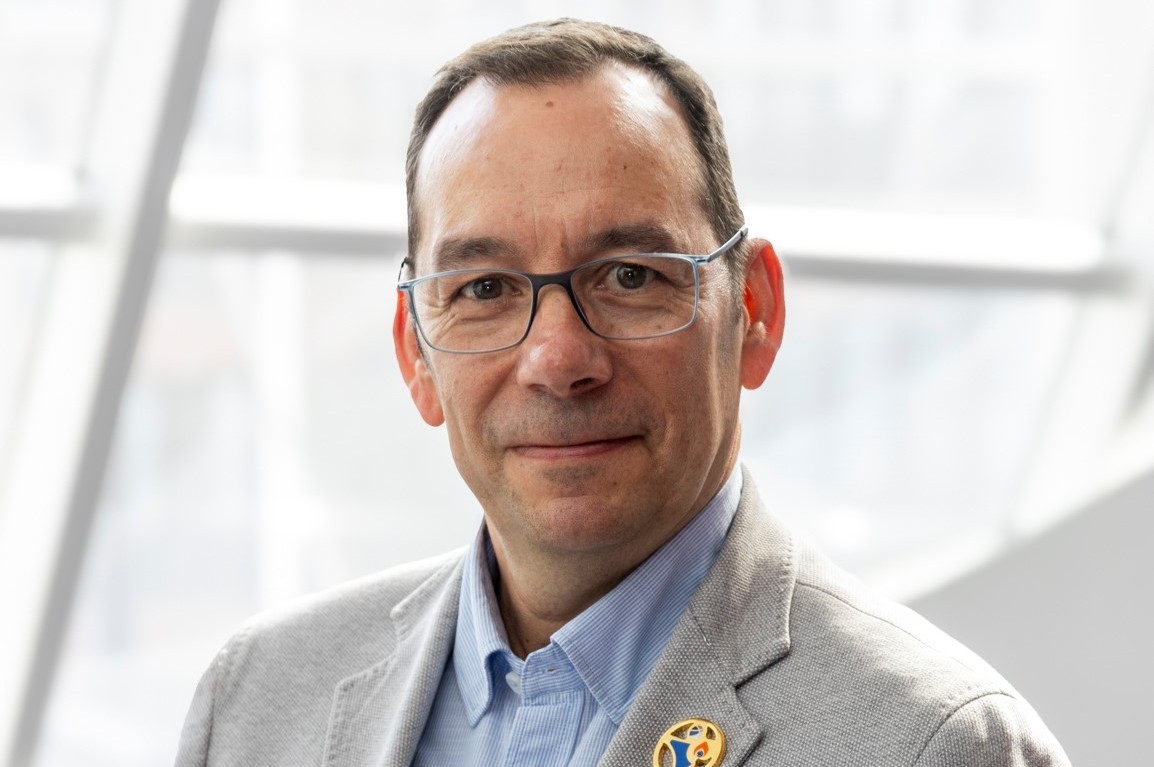
Ahead of UNGA 80, ICN President Dr José Luis Cobos Serrano sent a letter to UN Secretary-General António Guterres urging immediate action to end attacks on health care in conflict zones and ensure access to food, care, and humanitarian aid.
ICN continues to advocate for the protection of health workers and civilians through its #NursesforPeace campaign, Humanitarian Fund, and partnership with Direct Relief. At its recent Helsinki Congress, ICN’s governing body passed an emergency resolution condemning rising attacks on health care, demanding compliance with international humanitarian law, and calling for accountability for violations.
As ICN highlighted in its comprehensive briefing document, this year's UNGA took place amid unprecedented global health challenges, from growing inequalities, deepening geopolitical divides, rising conflicts, the worsening climate crisis, to global health funding challenges. This made ICN’s work to raise the nursing voice and promote investment in nursing as a proven, cost-effective solution to global health challenges especially urgent and important at this year’s UNGA.
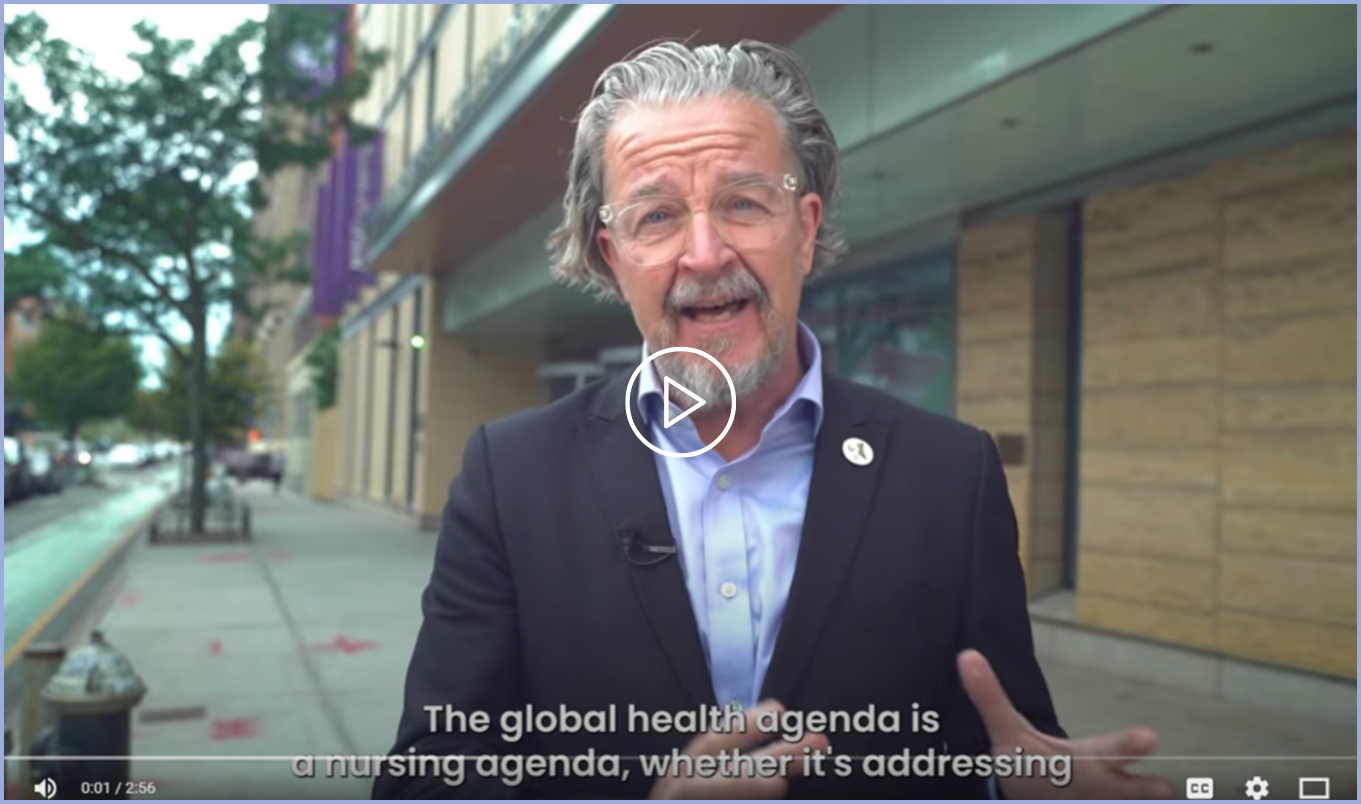
Key areas of ICN’s advocacy at UNGA80 included:
1. The Fourth High-Level Meeting on Noncommunicable Diseases and Mental Health (HLM4)
- ICN participation at HLM4 and panels
ICN was present and involved at HLM4, the week’s most significant health session focused on noncommunicable diseases (NCDs) and the first UN High-Level Meeting to fully integrate mental health into the NCD agenda. On 25 September, ICN participated in key panels that shaped the meeting's outcomes, including Panel 1: "Tackling the determinants of noncommunicable diseases and mental health and well-being through multisectoral and effective governance and collaborative action" and Panel 2: "Reshaping and strengthening health systems and all forms of financing to meet the needs of people living with and at risk of noncommunicable diseases and mental health conditions."
The historic meeting addressed NCDs as the world’s leading cause of death, killing 43 million people annually, while noting that every $1 invested in NCD prevention saves $7. A draft Declaration on NCDs was discussed by UN member states. For ICN, the meeting provided a critical platform to demonstrate that nurses are the foundation of primary and preventive health care that WHO has affirmed is critical to addressing NCDs.
- ICN welcomed country commitments to tackle NCDs despite challenges
The UN NCDs Declaration was not ultimately approved by full consensus at the High-Level meeting and will now go to a vote at the General Assembly. ICN calls on leaders to work together to adopt a strong Declaration with clear commitments and ambitious targets for reducing NCDs and their effects.
However, ICN welcomed the overwhelming support from leaders from across regions to addressing NCDs, including commitments to bold measures to increase access to mental health care and immunization, reduce tobacco use, and improve management of hypertension and other conditions, recognizing that NCDs are the leading cause of death worldwide. ICN especially welcomed strong statements from country leaders emphasizing the importance of nurses and health workers in NCD prevention, education, management, and treatment across all care settings and the entire care continuum.
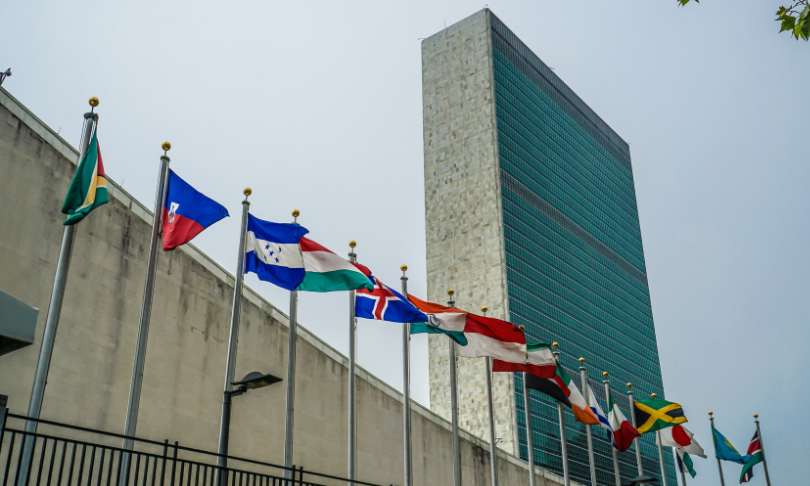
- ICN’s advocacy to prioritize the nursing and health workforce as the backbone of NCD response
On 25 September, ICN issued a strong joint statement with the World Health Professions Alliance (WHPA), warning governments that commitments to address NCDs would fail unless countries urgently invest in their health workforce. The WHPA statement, supported by ICN, emphasized that high-quality care delivered by health professionals is one of the most cost-effective strategies to meet the needs of people living with or at risk of NCDs and mental health conditions.
Throughout the week, ICN advocated for explicit recognition of nursing as a ‘best buy’ for addressing NCDs and called for leaders to prioritize nursing workforce development in all NCD strategies.
ICN’s delegation attended "Promoting Person-Centered NCDs and Mental Health Policies in the Global Community: Japan's Leadership and Contribution in Asia and Globally," hosted by the Health and Global Policy Institute and NCD Alliance Japan on 26 September. This event highlighted Japan's leadership in UHC and NCD policy, emphasizing primary health care, healthy aging, and community-based care models, and recognized nurses as essential for community-based services.
2. Elevating the nursing voice on mental health
Mental health was a central UNGA 80 health priority, reflecting its integration into the NCD agenda. ICN's advocacy reiterated that nurses are absolutely essential to addressing mental health challenges, emphasizing that nurses deliver 55% of mental health services globally while representing just 1% of the total nursing workforce, and they must be valued and empowered as central to mental health care.
ICN attended the WHO, Wellcome Trust, and United for Global Mental Health event "No Health Without Mental Health: A shared commitment” and built key connections with stakeholders in the global mental health community. The event gathered heads of state, WHO leadership, and civil society leaders to push forward commitments to mental health in the Political Declaration.
ICN also advocated strongly for nurses’ own mental health. ICN’s CEO Howard Catton spoke at the "High-Level Roundtable on Protecting the Mental Health of Health Workers: Resilience and Retention for the Future," hosted by the Frontline Health Workers Coalition and the John Sloan Dickey Center at Dartmouth on 23 September. The roundtable launched a two-year task force to coordinate programmatic and policy action on health worker mental health, providing ICN with an opportunity to ensure nursing perspectives are embedded in this important initiative. Mr Catton’s intervention highlighted the urgent need to address the wellbeing crisis among nurses and other health workers that threatens the sustainability of health systems globally and presented evidence-based actions needed.
3. ICN's event: “Shaping Global Health Policy Through Nursing Leadership”
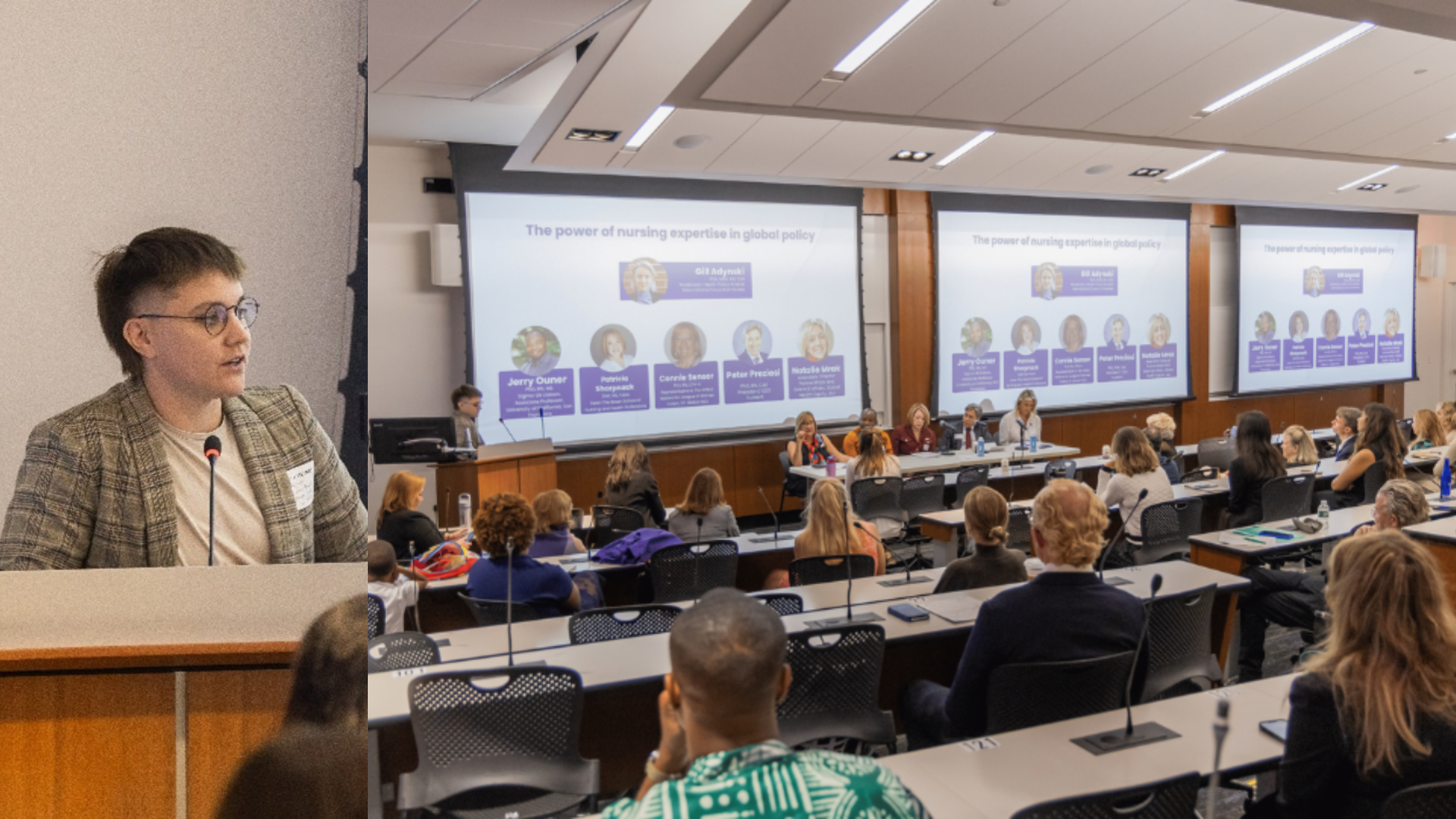
On 27 September, ICN hosted an impactful side event "Shaping Global Health Policy Through Nursing Leadership: Partnerships and Solutions for a Healthier World," in collaboration with NYU Rory Meyers College of Nursing and sponsored by TruMerit and Johnson & Johnson. The event brought together leading voices from education, regulation, government, health services, and major nursing organizations to accelerate collaboration between nursing stakeholders and reinforce the message that the global health agenda is fundamentally a nursing agenda. The event demonstrated the power of partnership across nursing organizations and reinforced ICN's role as the global voice of nursing, uniting the world’s nurses to amplify the profession’s influence on international health policy at the highest levels. All of ICN’s delegation participated, as well as ICN’s Immediate Past President Dr Pamela Cipriano.


4. Global health workforce development
ICN played a strong role in the Saudi Commission for Health Specialties' "Health Without Borders: Building a Global Workforce for the Future" event on 22 September, which focused on accelerating workforce development, mobility, and capacity. ICN CEO Howard Catton spoke on the panel Safeguarding the future of an interconnected health workforce by 2030 alongside Jarbas Barbosa da Silva, Director of WHO Pan American Health Organization, discussing the grave shortage of health workers and the urgent need to ensure ethical, equitable nurse migration.
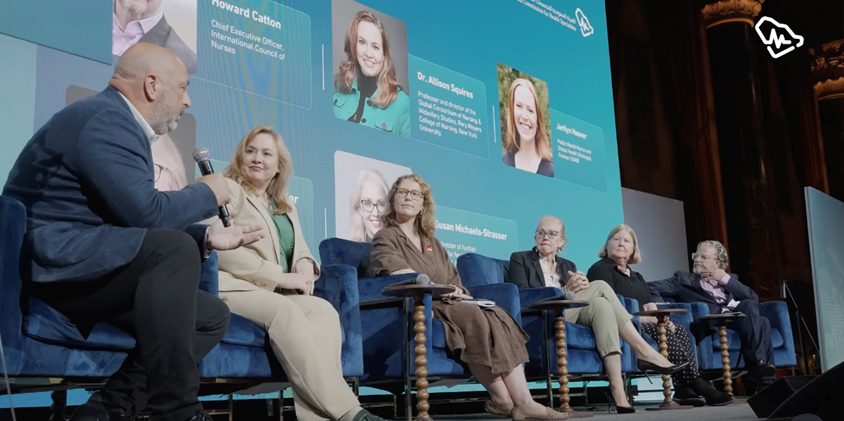
Mr Catton also spoke on a separate panel, Ensuring a globally sustainable nursing workforce, with several important nurse leaders including Allison Squires, Jerilyn Hoover, and Susan Michaels-Strasser. ICN delivered clear messages on the investment, resources, collaboration, an actions needed to safeguard the nursing workforce urgently necessary for a healthy future for all.
ICN’s delegation also attended the "A New Vision for the Health Workforce: Addressing NCDs, global health security and emergencies" event hosted by the Frontline Health Workers Coalition and partners including CARE USA, Seed Global Health, Johnson & Johnson, and Project HOPE, on 23 September. This session highlighted the need for urgent investment in health workers to meet rising demands from NCDs, pandemics, and emergencies, echoing ICN’s core position that strengthening the nursing and health workforce is the only way to ensure resilience, equity, and global health security.
5. Strengthening infrastructure, health financing, and community care
ICN’s CEO delivered an intervention at the high-level event on “Achieving safe, sustainable, and universal WASH, waste and electricity services
in health care facilities: Progress on the 2023 General Assembly Resolution”, hosted by Hungary and the Philippines in collaboration with WHO and UNICEF on 24 September. The meeting featured important guests including Hungary’s Minister of Foreign Affairs and Trade Mr. Péter Szijjártó, the Philippines Minister of Health Ted Herbosa, and Regional Director for WHO Europe Dr Hans Henri P. Kluge.
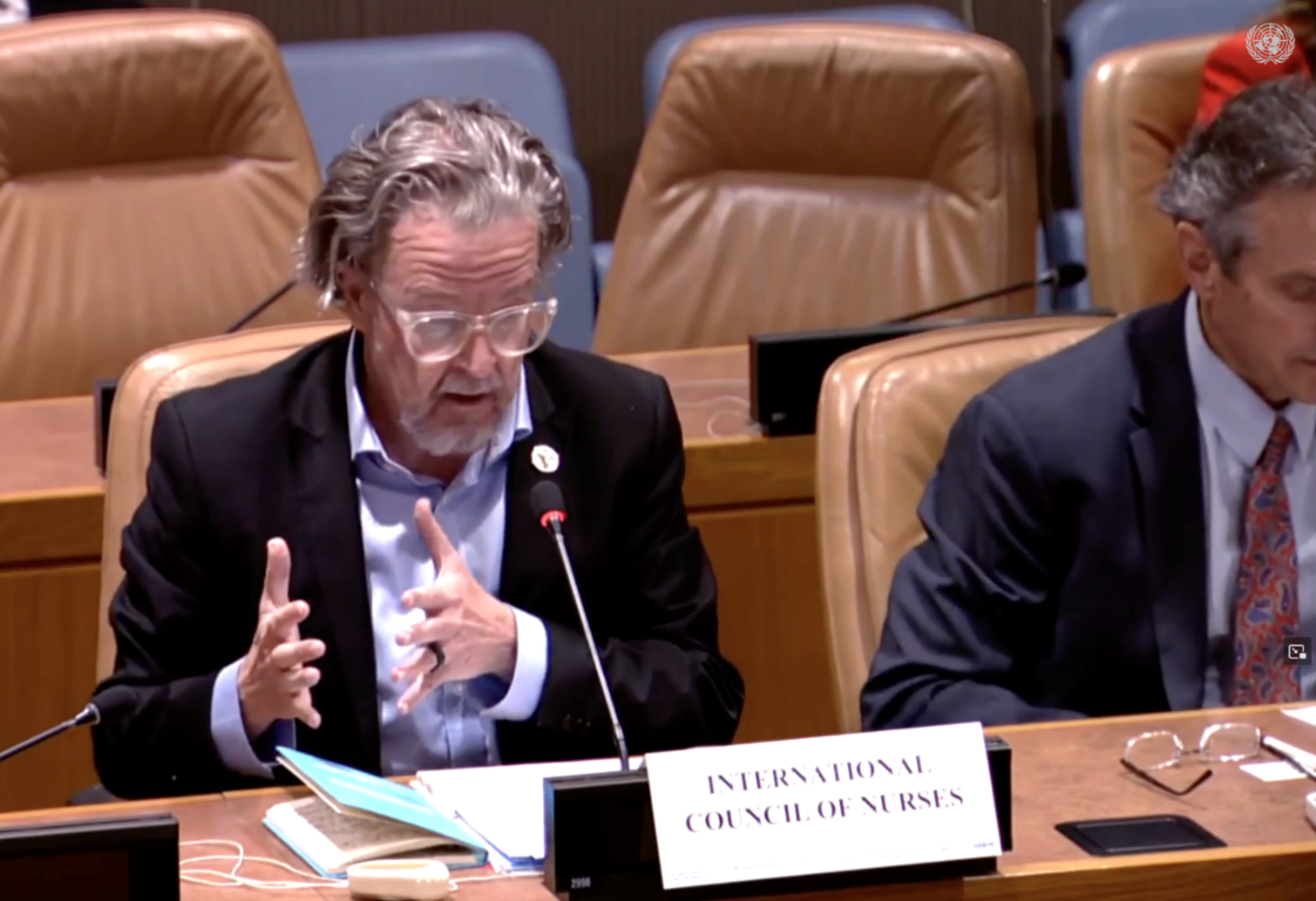
Mr Catton's intervention centred the nursing workforce in WASH advocacy and highlighted how inadequate infrastructure disproportionately affects nurses and women health workers who face heightened exposure to infectious pathogens. He called for urgent investment in WASH as an investment in both patient safety and workforce safety, which mutually reinforce each other.
ICN also participated in multiple high-level events focused on sustainable health financing, critical to achieving all health goals and ensuring health systems remain resilient and equipped to respond to future crises. These included the Seed Global Health event "Beyond Aid: Financing Health Systems for Impact and Growth" on 22 September, which advocated for shifting from fragmented, short-term aid toward long-term investments in strong national health systems. ICN also took part in the World Economic Forum session "Redefining the Private Sector's role in Global Public Health Financing" on 26 September, an event that provided opportunities to engage with high-level stakeholders on innovative financing mechanisms for health system strengthening. ICN’s CEO made a strong intervention highlighting the powerful economic case for investing in the nursing and health workforce, which is often a significant gap in donor and philanthropy funding initiatives.
On 22 September, ICN’s delegation attended the United for Self-Care Roundtable on "Unlocking the Potential of Self-Care in the Fight Against NCDs," hosted by BCIU and the Global Self-Care Federation. This event elevated self-care as a pillar in NCD and UHC strategies, and ICN's participation highlighted how nursing can support health literacy and community-based self-care interventions, reinforcing the profession's role in health promotion and disease prevention.
6. Building partnerships and civil society engagement
ICN engaged in strategic meetings strengthening its partnerships, including with the President of the Conference of NGOs in Consultative Relationship with the UN (CoNGO), and the CEO of TruMerit to discuss shared goals focused on strengthening collaboration within the UN system and reinforcing the importance of a united civil society voice to ensure nursing and broader NGO perspectives are heard at UN forums.
ICN CEO Howard Catton concluded:
“UNGA 80 has been a pivotal moment for global nursing advocacy. ICN has brought the voice of the world’s 30 million nurses to the UN, engaging at the highest levels on NCDs, mental health, and all aspects of global health — and demonstrating that nurses are at the absolute centre of the solutions to our world’s most pressing health challenges. This week, we have strengthened partnerships, presented clear evidence and messages, and heard powerful recognition from world leaders that nurses are the backbone of every health system and the key to achieving every health goal we've set as a global community.
‘We must now ensure that the progress made here in New York translates into real action to invest in and value the nursing workforce our world so desperately needs to bring health to all people.